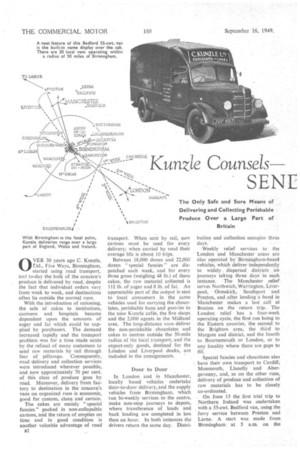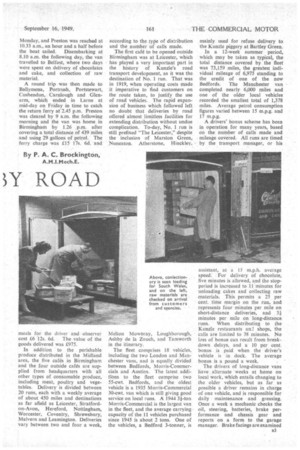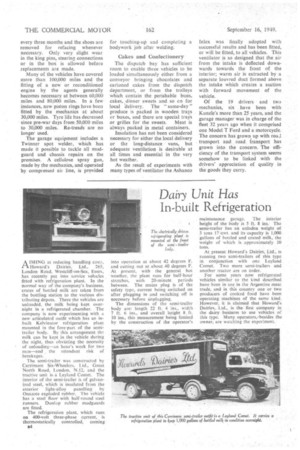K UnZ e Counsels
Page 36

Page 37

Page 38

If you've noticed an error in this article please click here to report it so we can fix it.
SENT Y ROAD
By P. A. C. Brockington,
A.M .1. M ech.E.
0 VER 30 years ago C. Kunzle, bd., Five Ways, Birmingham, started using road transport, and to-day the bulk of the concern's produce is delivered by road, despite the fact that individual orders vary from week to week, and destinations often lie outside the normal runs.
With the introduction of rationing, the sale of cakes to institutions, canteens and hospitals became dependent upon the amounts of sugar and fat which could be supplied by purchasers. The demand increased rapidly and the transport problem was for a time made acute by the refusal of many customers to send raw materials by rail through fear of pilferage. Consequently, road delivery and collection services were introduced wherever possible, and now approximately 70 per cent. of this class of produce goes by road. Moreover, delivery from factory to destination in the concern's vans on organized runs is economic, good for custom, clean and certain.
The cakes are Mainly "special fancies" packed in non-collapsible cartons, and the return of empties on time and in good condition is another valuable advantage of road a2 transport. When .sent by rail, new cartons must be used for every delivery; when carried by road their average life is about 10 trips.
Between 18,000 dozen and 22,000 dozen "special fancies" are dispatched each week, and for every three gross (weighing 48 lb.) of these cakes, the raw material collected is 111 lb. of sugar and 8 lb. of fat. An appreciable part of the output is sent to local consumers in the same vehicles used for carrying the chocolates, perishable buns and pastries to the nine Kunzle cafes, the five shops and the 2,000 agents in the Midland area. The long-distance vans deliver the non-perishable chocolates and cakes to centres outside the 50-mile radius of the local transport, and the export-only goods, destined for the Lo-ndon and Liverpool docks, are included in the consignments,
Door to Door
In London and in Manchester, locally based vehicles undertake 'door-to-door delivery, and the supply vehicles from Birmingham, which run bi-weekly services to the centre, make non-stop journeys to depots, where transference of loads and back loading are completed in less than an hour. In both instances the drivers return the same day. Distri
bution and collection occupies three days.
Weekly relief services to the London and Manchester areas are also operated by Birmingham-based vehicles, which deliver independently to widely dispersed districts on journeys taking three days in each instance. The Manchester relief serves No rth wich, Warrington, Liverpool, Ormskirk, Southport and Preston, and .after lending a hand in Manchester makes a last call at Buxton on the return trip. The London relief has a four-week operating cycle, the first run being to the Eastern counties, the second to the Brighton area, the third to Margate and district, and the fourth to Bournemouth or London, or to any locality where there are gaps to fill.
Special fancies and chocolates also have their own transport to Cardiff, Monmouth, Llanelly and Abergavenny, and, as on the other runs, delivery of produce and collection of raw materials has to be closely co-ordinated.
On June 13 the first trial trip to Northern Ireland was undertaken with a 55-cwt. Bedford van, using the ferry service between Preston and Lame, A start was made from Birmingham at 5 a.m. on the
Monday, and Preston was reached at 10.33 a.m., an hour and a half before the boat sailed. Disembarking at 8.10 a.m. the following day, the van travelled to Belfast, where two days were spent on delivery of chocolates and cake, and collection of raw material.
A round trip was then made to Ballymena, Portrush, Portstewart, Cushendun, Carnlough and Glenarm, which ended in Larne at mid-day on Friday in time to catch the return ferry at 2.45 p.m. Preston was cleared by 9 a.m. the following morning and the van was home in Birmingham by 1,26 p.m. after covering a total distance of 439 miles and using 29 gallons of petrol. The ferry charge was £15 17s. 6d. and meals for the driver and observer cost £6 12s. 6d. The -value of the goods delivered was £975.
In addition to the perishable produce distributed in the Midland area, the five cafes in Birmingham and the four outside cafes are supplied from headquarters with all other types of consumable produce, including meat, poultry and vegetables. Delivery is divided between 20 runs, each with a weekly average of about 450 miles and destinations as far afield as Leicester, Stratfordon-Avon, Hereford, Nottingham, Worcester, Coventry, Shrewsbury, Malvern and Leamington. Deliveries vary between two and four a week, according to the type of distribution and the number of calls made.
The first cafe to be opened outside Birmingham was at Leicester, which has played a very important part in the history of Kunzle's road transport development, as it was the destination of No 1 run. That was in 1919, when operating costs made it imperative to find customers on the route taken, to justify the use of road vehicles. The rapid expansion of business which followed left no doubt that deliveries by road offered almost limitless facilities for extending distribution without undue complication. To-day, No. 1 run is still prefixed "The Leicester," despite the inclusion of Marston Green, Nuneaton. Atherstone, Hinckley,
Mellon Mowbray, Loughborough, Ashby de la Zouch, and Tamworth in the itinerary.
The fleet comprises 18 vehicles, including the two London and Manchester vans, and is equally divided between Bedfords, Morris-Commercials and Austins. The latest additions to the fleet comprise two 55-cwt. Bedfords, and the oldest vehicle is a 1935 Morris-Commercial 30-cwt. van which is still giving good service on local runs. A 1944 3i-ton Morris-Commercial is the largest van in the fleet, and the average carrying capacity of the 11 vehicles purchased since 1945 is about 2 tons. One of the vehicles, a Bedford 3-tonner, is mainly used for refuse delivery to the Kunzle piggery at Bartley Green.
In a 12-week summer period, which may be taken as typical, the total distance covered by the fleet was 73,159 miles, the greatest individual mileage of 6,975 standing to the credit of one of the new Bedfords. The Manchester van completed nearly 6,000 miles and one of the older local vehicles recorded the smallest total of 1,378 miles. Average petrol consumption figures varied between 15 m.p.g. and 17 mpg.
A drivers' bonus scheme has been in operation for many years, based on the number of calls made and mileage covered. All runs are timed by the transport manager, or his assistant, at a 15 m.p.h. average speed: For delivery of chocolate, five minutes is allowed, and the stopperiod is increased to 11 minutes for unloading cakes and collecting raw materials. This permits a 25 per cent. time margin on the run, and represents four minutes per mile on short-distance deliveries, and 31minutes per mile on long-distance runs. When distributing to the Kunzle restaurants an shops, the calls are limited to 38 minutes. No loss of bonus can result from breakdown delays, and a 10 per cent. bonus is paid when the driver's vehicle is in dock. The average bonus is a pound a week.
The drivers of long-distance vans have alternate weeks at home on local work, which entails changing to the older vehicles, but as far as possible a driver remains in charge of one vehicle, and is responsible for daily maintenance and greasing. Once a week a mechanic checks the oil, steering, batteries, brake performance and chassis gear and reports on a form to the garage manager. Brake facings are examined every three months and the shoes are removed for refacing whenever necessary. Only very slight wear in the king pins, steering connections or in the box is allowed before replacements are made.
Many of the vehicles have covered more than 100,000 miles and the fitting of a new or reconditioned engine by the agents generally becomes necessary at between 60,000 miles and 80,000 miles. In a few instances, new piston rings have been fitted by the mechanics at about 30,000 miles. Tyre life has decreased since pre-war days from 50,000 miles to 30,000 miles. Re-treads are no longer used.
The garage equipment includes a Twinner spot welder, which has made it possible to tackle all mudguard and chassis repairs on the premises. A cellulose spray gun, made by the mechanics, and operated by compressed air line, is provided for touching-up and completing a bodywork job after welding.
Cakes and Confectionery
The dispatch bay has sufficient room to enable three vehicles to be loaded simultaneously either from a conveyor bringing chocolates and cartoned cakes from the dispatch department, or from the trolleys which contain the perishable buns, cakes, .dinner sweets and so on for local delivery. The " same-day " produce is packed in wooden trays or boxes, and there are special trays or grilles for the sweets. Meat is always packed in metal containers.
Insulation has not been considered necessary for either the local delivery or the long-distance vans, , but adequate ventilation is desirable at all times and essential in the very hot weather.
As the result of experiments with many types of ventilator the Ashanco Inlex was finally adopted with successful results and has been fitted, or will be fitted, to all vehicles. This ventilator is so designed that the air from the intake is deflected downwards towards the front of the interior; warm air is extracted by a separate louvred duct formed above the intake which creates a suction with forward movement of the vehicle.
Of the 19 drivers and two mechanics, six have been with Kunzle's more than 23 years, and the garage manager was in charge of the fleet 32 years ago when it comprised one Model T Ford and a motorcycle. The concern has grown up with road transport and road iransport has grown into the concern. The efficiency of the transport system seems somehow to be linked with the drivers' appreciation of quality in the goods they carry.




















































































